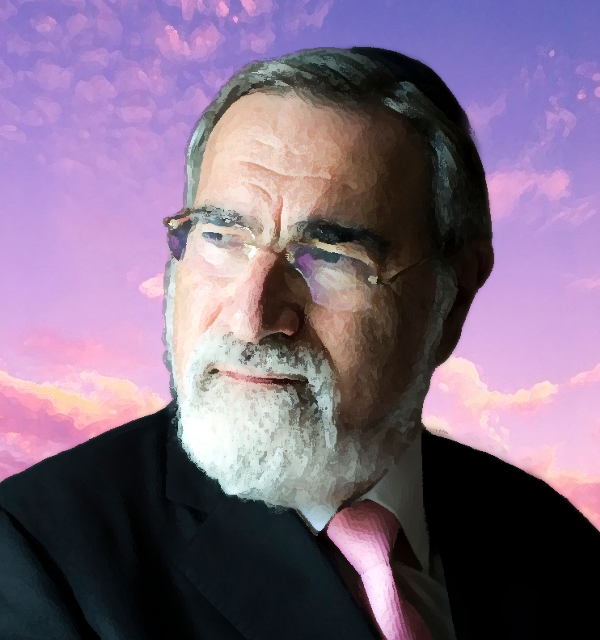Building the Future, Remembering the Past

This Dvar Torah is written by Rabbi Ed Farber, Rabbi Emeritus of Beth Torah Benny Rok Campus, who is currently teaching a class in CAJE’s Department of Adult Learning and Growth entitled “Judaism’s Life-Changing Ideas: An Exploration of the Thinking of Rabbi Jonathan Sacks (z”l).”

One of the astounding and insightful skills of Rabbi Jonathan Sacks (z”l), who died on the 20th of (the Hebrew month of) Heshvan last year, was his ability to distill from Torah literature something he called “Life-Changing Ideas.” It reminds me very much of the late Dr. Max Kadushin whose groundbreaking work illustrated how the Rabbis analyzed the actions of personalities we find in the Torah and the rest of the Bible and then extrapolated from them ideas that conveyed the fundamental value concepts of Judaism.
In this week’s parshah, Chayei Sarah, which includes first a description of the death of Sarah and then subsequently, the death of Abraham, the Torah says that our patriarch “breathed his last and died at an advanced age, old and satisfied.” This is, as Rabbi Sacks points out, the most ‘serene’ death in the Torah.
But when we look back on his life, we see that Abraham went through many trials – the Rabbis name 10 – and most of them were extremely challenging (Bereisheet/Genesis 12:1- Leave your homeland, your birthplace, your father’s house and go to a land I will show you); others were harrowing (Bereisheet/Genesis 22:2- Take your beloved son, your only son, Isaac, and sacrifice him on a mountain that I will show you). Add to that the famines that forced him into exile, where his life was in danger.
Consider that Abraham had been promised countless children – as many as the dust of the earth and the stars of the sky (Bereisheet/Genesis 15:5) -- but Abraham was still childless in old age. Then after the birth of a son – Yishmael – who he had with Sarah’s handmaid Hagar, he is told to send the son away – a son he loved.
Let’s go further. The other promise to Abraham was that he would possess a land – the land of Canaan – but in the beginning of this week’s parshah, Sarah has died and not only doesn’t he possess a ‘land,’ he doesn’t even own a single square inch of territory on which to bury her. Imagine how painful that must have been for Abraham!
On the surface, his life is one of “disappointed hopes and delayed fulfillments,” as described by Rabbi Sacks. The question therefore is – what kind of man was this, that the Torah can say that he died “at an advanced age, old and satisfied”?
Rabbi Sacks draws then on his numerous experiences with Holocaust survivors, whose lives were far more challenged and disappointing than Abraham’s ever was (with the exception, I think, of the trial he underwent in being asked to sacrifice Yitzhak/Isaac). He asked himself-- how was it possible that these Holocaust survivors, who had lost most, if not all, of their families, and everything they had, who had endured horrors and unimaginable suffering at the hands of the Nazis, could go forward and rebuild their lives?
His conclusion is that when the war ended, “most focused with single-minded intensity on the future, or if not on the future, then on the present, taking it day by day.” Like Abraham, they were strangers in a strange land, and yet, they were able to build homes and careers, marry and have children, bringing new life into the world.
In addition, Rabbi Sacks noted that most survivors did not talk about their experiences during the Shoah with anyone beyond other survivors. This silence lasted, in many cases, for as long as fifty years. Only when their future was secure, did survivors allow themselves to look back and bear witness to what they had suffered and seen.
Some of them wrote books, and many went around schools, telling their story so that the Holocaust could not be denied. But, as Rabbi Sacks points out so astutely, they did not allow themselves to do that until they had first built their future. “First they built their future, only then did they allow themselves to remember the past.” That is what Abraham did in this parshah.
Rabbi Sacks points out that at the age of 137, Abraham had one unmarried son, no land, and had fathered no nations, as far as he could discern. Yet, he uttered not a single word of complaint. Instead, he acted. He bought a burial site for Sarah and the family, and set out to make sure his son Yitzhak/Isaac married and continued the family.
Abraham realized that God wanted him to act, not to complain or wait for God to do the work for him. And this is what the Jewish people did after the Holocaust.
“Three years after standing eyeball-to-eyeball with the angel of death at Auschwitz, David Ben-Gurion proclaimed the Jewish State in our people’s ancient homeland, the land of Israel.”
It was as if the Jewish people had said, in the words of Kind David, “I will not die, but live” (Psalm 118:17). Rabbi Sacks continues, “That is why the West’s oldest nation [Israel] is still young, a world leader in life-saving medicine, disaster relief, and life-enhancing technology.”
Here is a message for the world that Rabbi Sacks derives from Abraham, our survivors and the values of the Jewish people:
“TO SURVIVE TRAGEDY AND TRAUMA,
FIRST BUILD THE FUTURE.
ONLY THEN, REMEMBER THE PAST.”
As we conclude the week of Rabbi Sack’s yahrzeit [anniversary of a death], we can say with great confidence that his memory is truly a blessing to the Jewish people and all those who are privileged to continue learning from him through the wise and unique teachings he has left for all of us to study.
Shabbat Shalom




